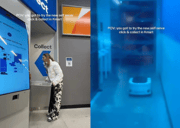Free courses are helping seniors fight back against scammers—and it’s working!
By
Maan
- Replies 0
Seniors in Kiama have become the latest target of cybercriminals.
As pop-up scams, fake texts and phishing emails grow more convincing, many older Australians are falling victim to schemes designed to steal their money—or even their identities.
But a new initiative in Kiama could help turn the tide.
In a joint effort to protect the community, Kiama Library and Kiama and Shoalhaven Community College (KSCC) launched two free digital literacy programs aimed at helping older residents stay safe online.
The Tech Savvy Seniors course catered to those over 60, while the Cyber Security Awareness course welcomed participants aged over 50.
Robert Murphy, KSCC’s vocational and education training manager, said the cyber security course was designed to arm people with tools to recognise and respond to digital threats.

‘The idea is to empower people to have some skills to identify any security threats, spam and associated malware and software and give them some practical tips,’ Murphy said.
From dodgy links in emails to scam texts pretending to be from banks or postal services, the digital threat landscape was rapidly evolving.
‘(It) used to be phone calls, now it’s the text messages,’ Murphy added.
‘The big message out there is if you don’t know who it is and you didn’t contact them, it is potentially a scam.’
He explained the tactic known as ‘phishing’ by comparing it to a day at the river.
‘If you think you’re going to the river for a fish, well you are out there trying to get the biggest fish you can,’ he said.
‘So, these people are doing something similar. They are trying to extract information out of you.’
‘And that could be something very, very small, but if they get enough information or they piece the bits together, they can do things like take over your identity at the far end of the scale.’
Michelle Hudson, manager of library and cultural hubs, said the library’s Tech Savvy Seniors program was designed to make digital learning less intimidating.
‘It’s giving people that confidence in that small classroom setting,’ Hudson said.
‘They have a maximum of 10 people, so that (if) people feel that they don’t understand, that everyone is in the same position.’
‘Sometimes they are finding out things from other people’s questions.’
She noted the importance of empowering seniors without instilling fear.
‘Acknowledgement that they do need to be careful, but you don’t want that to stop people,’ she said.
‘Giving them that bigger understanding of how they can do that safely (engage with technology) and how they can share information safely.’
‘Unfortunately, that demographic (over 50s) does often get targeted (by scammers).’
According to the 2024 National Anti-Scam report, Australians aged 65 and over reported the highest financial losses to Scamwatch—totalling $99.6 million last year, which made up nearly one third of all reported scam losses.
Adding to that concern was a recent high-profile data breach at Qantas, which exposed the information of 5.7 million customers.
Stolen data from incidents like these could end up on the dark web and be sold to scammers, who use it for fraudulent activity or identity theft.
Hudson said the Kiama and Gerringong libraries remained safe spaces where community members could access help.
‘The libraries are seen as that safe and welcoming place,’ she said.
‘We’re trusted and we can gently guide you through those sorts of interactions, and mention things like cyber safety and make sure that they are thinking about all of the different elements of technology.’
TheTech Savvy Seniors course, delivered in partnership with the NSW government and Telstra, was free and expected to continue once the next round of funding was secured.
Meanwhile, the Cyber Security Awareness course is also free for eligible participants and available at both the Kiama Campus and the Shoalhaven Community College.
If you've ever felt overwhelmed by phishing attempts or unsure how to spot a scam, you're not alone.
Building digital confidence takes time, and it helps to have step-by-step support that breaks down the basics.
One practical example comes from an ongoing learning series that dives into essential cybersecurity knowledge in an easy-to-follow format.
Read more: Cybersecurity for Aussies Over 60: Module 1

Could a simple free course be all it takes to stop scammers in their tracks?
As pop-up scams, fake texts and phishing emails grow more convincing, many older Australians are falling victim to schemes designed to steal their money—or even their identities.
But a new initiative in Kiama could help turn the tide.
In a joint effort to protect the community, Kiama Library and Kiama and Shoalhaven Community College (KSCC) launched two free digital literacy programs aimed at helping older residents stay safe online.
The Tech Savvy Seniors course catered to those over 60, while the Cyber Security Awareness course welcomed participants aged over 50.
Robert Murphy, KSCC’s vocational and education training manager, said the cyber security course was designed to arm people with tools to recognise and respond to digital threats.

Free courses tackle rising online scam threats. Image source: Pexels/cottonbro studio
Disclaimer: This is a stock image used for illustrative purposes only and does not depict the actual person, item, or event described.
Disclaimer: This is a stock image used for illustrative purposes only and does not depict the actual person, item, or event described.
‘The idea is to empower people to have some skills to identify any security threats, spam and associated malware and software and give them some practical tips,’ Murphy said.
From dodgy links in emails to scam texts pretending to be from banks or postal services, the digital threat landscape was rapidly evolving.
‘(It) used to be phone calls, now it’s the text messages,’ Murphy added.
‘The big message out there is if you don’t know who it is and you didn’t contact them, it is potentially a scam.’
He explained the tactic known as ‘phishing’ by comparing it to a day at the river.
‘If you think you’re going to the river for a fish, well you are out there trying to get the biggest fish you can,’ he said.
‘So, these people are doing something similar. They are trying to extract information out of you.’
‘And that could be something very, very small, but if they get enough information or they piece the bits together, they can do things like take over your identity at the far end of the scale.’
Michelle Hudson, manager of library and cultural hubs, said the library’s Tech Savvy Seniors program was designed to make digital learning less intimidating.
‘It’s giving people that confidence in that small classroom setting,’ Hudson said.
‘They have a maximum of 10 people, so that (if) people feel that they don’t understand, that everyone is in the same position.’
‘Sometimes they are finding out things from other people’s questions.’
She noted the importance of empowering seniors without instilling fear.
‘Acknowledgement that they do need to be careful, but you don’t want that to stop people,’ she said.
‘Giving them that bigger understanding of how they can do that safely (engage with technology) and how they can share information safely.’
‘Unfortunately, that demographic (over 50s) does often get targeted (by scammers).’
According to the 2024 National Anti-Scam report, Australians aged 65 and over reported the highest financial losses to Scamwatch—totalling $99.6 million last year, which made up nearly one third of all reported scam losses.
Adding to that concern was a recent high-profile data breach at Qantas, which exposed the information of 5.7 million customers.
Stolen data from incidents like these could end up on the dark web and be sold to scammers, who use it for fraudulent activity or identity theft.
Hudson said the Kiama and Gerringong libraries remained safe spaces where community members could access help.
‘The libraries are seen as that safe and welcoming place,’ she said.
‘We’re trusted and we can gently guide you through those sorts of interactions, and mention things like cyber safety and make sure that they are thinking about all of the different elements of technology.’
TheTech Savvy Seniors course, delivered in partnership with the NSW government and Telstra, was free and expected to continue once the next round of funding was secured.
Meanwhile, the Cyber Security Awareness course is also free for eligible participants and available at both the Kiama Campus and the Shoalhaven Community College.
If you've ever felt overwhelmed by phishing attempts or unsure how to spot a scam, you're not alone.
Building digital confidence takes time, and it helps to have step-by-step support that breaks down the basics.
One practical example comes from an ongoing learning series that dives into essential cybersecurity knowledge in an easy-to-follow format.
Read more: Cybersecurity for Aussies Over 60: Module 1
Key Takeaways
- Kiama Library and KSCC launched free tech courses for older residents.
- Courses aimed to improve digital literacy and boost online safety.
- Scammers continue to evolve, targeting Australians aged over 50.
- Australians over 65 lost nearly $100 million to scams in 2023.
Could a simple free course be all it takes to stop scammers in their tracks?







